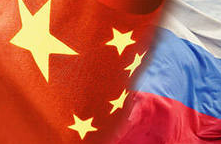Can Russia become politically irrelevant state?
By Justinas Valutis

Without a shadow of doubt, the recently signed Sino-Russian gas deal was a perfect opportunity to clink glasses for champagne lovers of both delegations. While one side was happy with the price, the other one looked content with its new customer and volume of the order. This gas supply treaty, which on a surface may look like an ordinary business deal, albeit very massive, marks the beginning of closer cooperation between the two eastern heavyweights in almost every aspect. It also will have an impact for the major geopolitical and energy sector players globally.
Take the European Union for instance.
As paper was still absorbing the fresh ink of the signatures under the treaty text in Shanghai, here in Europe the ragtag collection of bog - standard politicians, who proudly call themselves the European Commission, were left shell-shocked.
Those gentlemen saw their much celebrated leverage of a massive buying power slipping away. They realised that China passed the ball to Mr. Putin, who effectively is now in the driving seat when it comes to the EU - Russian relations. European leaders came very close to understanding that from now on any new package of sanctions against Russia may very well backfire, although officially both sides underline the importance of keeping the energy resources out of weaponry list.
Despite such bilateral declarations, the European Union is seeking to diversify its energy supply. However, other gas and oil rich nations such as Qatar, Norway, Azerbaijan, Iran or even the United States are not charity organisations, nor are they stupid enough not to exploit the new realities in a global gas market. They are likely to milk out some extra cash from the cornered EU, and the ordinary Europeans will be forced to pick up the bill.
Back in Russia, the news of sealing the deal with the Chinese was received as a very positive step, although it is still far too early to celebrate.
Yes, Mr. Putin shook away his annoying eternal European critics, who are now busy scratching their own heads, thinking of how to find a way out of their own potentially vulnerable position. But the Russian president also has his own problems to solve. Russia now stands at a crossroads that may lead it either to the direction of development or stagnation.
It is vital for the Russian leadership to understand that high price for the energy resources in the future and the 400-billion-dollar deal with China offers a perfect opportunity to modernise the world's largest country. This can be done by funding infrastructure projects, easing business climate and attracting foreign investors. And when we say 'foreign' that does not necessarily mean Western. In fact, money, if used wisely, can even help stabilise Russia's demographic situation especially in its long-neglected Far East region. But is Moscow ready to take concrete steps in order to make all that happen?
There are many sceptics who will say that it is not. According to them, Russia is traditionally a hostile country, when it comes to change or adaptation to new realities. However, the last ten years or so illustrate that the will to improve is alive and kicking.
Although, we have to admit that the majority of obvious 'technological leaps forward' can be observed almost exclusively within the defence industry. However, the hugely successful Sochi Winter Olympics was a clear sign that Russia has the vast amount of untapped potential to bring itself 'up to date' in other spheres of life too.
It is also important for policy makers in the Kremlin and the Duma to comprehend that the most valuable asset of their homeland is not oil, gas, gold or iron ore, it is the Russian people. Future citizens can have by far greater impact on their country's fortunes and prosperity than a mere sale of natural resources.
The income that Russia receives from export of fossils must not serve only as a filler of a budget holes or only as a fuel for furnaces of the military industrial complex. Gas or oil revenue also must be more actively reinvested in ordinary people through education and social programs, if the country wants to realise its whole human potential in the future. The potential, which is not absent, but rather suppressed by underfunding, colossal bureaucracy and corruption.
If those three issues are not addressed seriously, then Russia may go down the wrong path - the path of stagnation and weakening. Sandwiched between China in the east and the EU (NATO) in the west, Russia could face a dangerous transformation into resource-rich, but politically irrelevant state.
This is not a desirable development for humanity, because the world with several centres of political gravity will always remain a better option than unipolar dictate.
Justinas Valutis
Subscribe to Pravda.Ru Telegram channel, Facebook, RSS!


